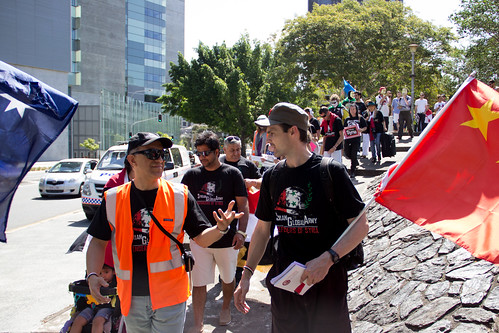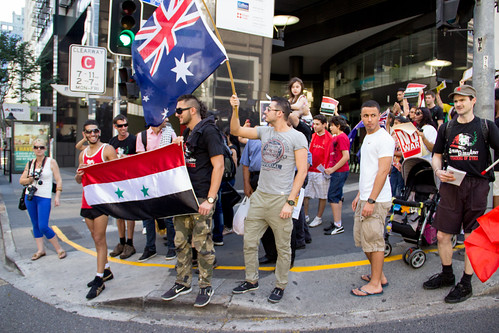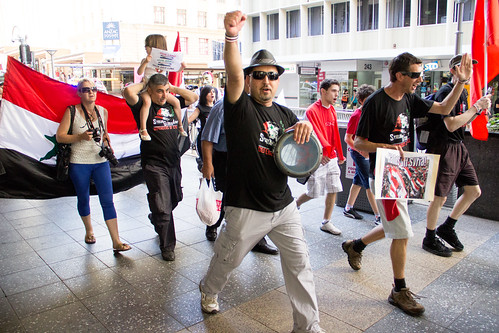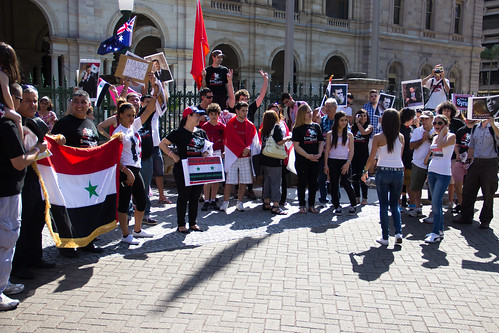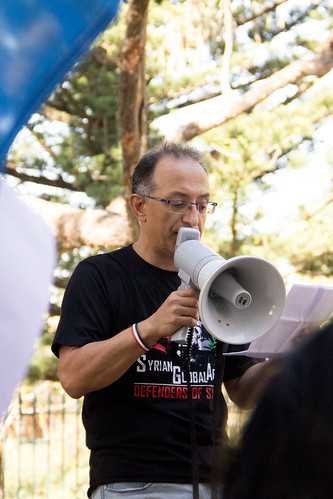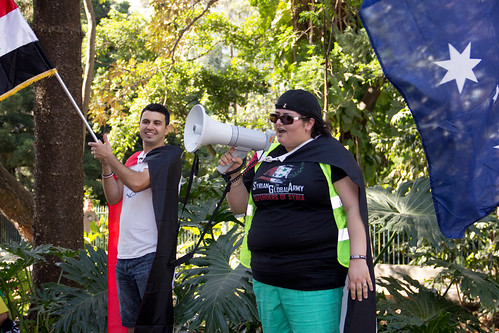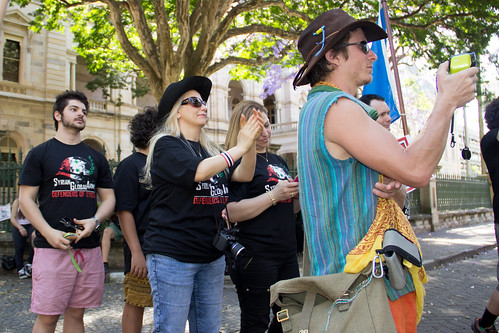The G20 circus brings with it some expected impositions. And despite the misgivings many people have about those impositions, most people just accept it as par for the course of hosting a large international meeting such as the G20. Public transport disruptions, road closures, increased police powers in certain zones and so on. But it’s all predicated on safety and security right? After all the special act brought in to give police increased powers and to define special security zones is called the G20 Safety and Security Act 2013. Some worrying powers come with this new one use Act. Presumption against bail, enhanced stop and search powers, prohibited items and prohibited persons lists being just some of the provisions. But surely it’s all about increased safety of citizens and G20 delegates. Isn’t it? The fact that loud hailers, masks, and banners larger than one by two metres, all of which are standard fare at protests under the current Peaceful Assembly Act (which is suspended in the G20 security zones), are listed as prohibited items under the G20 Safety and Security Act, isn’t an ominous sign of the suppression of protester’s voices and their ability to have an impact. It’s just that the police want a little extra control, to make sure everything goes smoothly.
Maybe. But there have been some interesting developments around town that make one wonder if the Government, and it’s agent the Queensland Police Force, aren’t very interested in keeping anti-G20 sentiment to a very minimum. In reports from protest groups, they have been told by Police Liaison Officers that despite protest group’s assemblies being registered and being lawful assemblies under the G20 Act, and despite the G20 Act specifying that carrying of prohibited items is acceptable if being used for a lawful purpose, carrying of loudhailers, masks and large banners are will not be tolerated. So there seems to be a messaging disconnect there. Yes we support your right to protest, but we are going to take away your most significant tools of protest.
Police Instructing Office Works Not to Print G20 Material
It’s not only within the G20 Act that this action by police to suppress the voice of protest has been observed. Recently we heard a rumour that police had forbidden Office Works to print any material submitted by customers relating to G20. I spoke to Kate, a manager at the CBD branch of Office Works yesterday to clarify what the situation was. I expected to hear that this was only a rumour:
Max: I am following up rumours that office works have been instructed by police not to print any material related to g20.
Kate: Yes that’s right.
Max: Interesting.
Max: From what level of the police service did that instruction come?
Kate: I don’t know, it was a specific request. The other thing is we actually reserve any right refuse to print any material at all that may give offence to any person, we reserve the right to refuse to print any material that might be deemed offensive. We have been specifically instructed not to print any anti-g20 material, but other than that we can refuse to print any material we deem may be offensive.
Max: Okay, that’s fair enough I understand that.
Max: Have you specifically deemed any and all g20 material offensive or you’ve not been even given the opportunity to determine that because you can’t print any at all?
Kate: No, anything particularly relating to G20, we’re not printing.
Max: Can I ask have you ever received any other request from police about certain material that shouldn’t be printed?
Kate: That I am aware of no, but I have no doubt that it has happened in the past. It’s just because of the political nature of it I assume. The police request was more to do with the fact that the thing was being used for vandal activity and it wasn’t okay. In each store we are not printing it because it could potentially cause offence to a person or persons but if there was a particular store which has been instructed not to print the material based on the fact it was being used for vandalism essentially.
Max: Was the police instruction that all G20 material was viewed as being related to vandalism or was it they didn’t want any of it printed just in case?
Kate: I’m not sure of the exact instruction, but we as a store are opting to not print any specific G20 material based on the fact that it will cause offence to a person or a persons.
It seems that what has happened is that police have issued an instruction about a particular incident, which may relate to the Cairns Grandmother Myra Gold who was refused service at an Office Works in Cairns. That refusal followed an incident in which MS Gold was arrested for posting G20 stickers and charged with vandalism. According to Office Works Cairns, police told the store not to print any more G20 stickers. Police denied any instructions had been made to businesses.
Kate from Brisbane CBD Office Works seemed pretty clear that police had specifically instructed the store not to print G20 materials, whilst also affirming that the store itself wasn’t interested in printing any G20 material regardless of the police instruction.
Community group BrisCAN recently also had service refused at Office Works recently. The material in this case was a Zine calling for alternatives to G20. Read it for yourself and judge whether the material is offensive or could be construed as offensive: G20 Peoples’ Zine. Unlike stickers or a poster, a Zine is not used in acts of vandalism but is distributed more like a newspaper.
G20 Billboards
 Brisbane Airport has recently rejected two billboards sought to be placed by WWF and Transparency International. The G20 targeted billboards were deemed “too political”. The WWF billboard draws attention to the need for action on Climate Change, while the Transparency International billboard calls for the G20 to act on dirty money and corruption. The Airport has ensured the public that they only rejected the billboards because they wish the airport to remain a partisan area, however this claim is weakened by the presence of the Reef facts billboard in the airport foyer.
Brisbane Airport has recently rejected two billboards sought to be placed by WWF and Transparency International. The G20 targeted billboards were deemed “too political”. The WWF billboard draws attention to the need for action on Climate Change, while the Transparency International billboard calls for the G20 to act on dirty money and corruption. The Airport has ensured the public that they only rejected the billboards because they wish the airport to remain a partisan area, however this claim is weakened by the presence of the Reef facts billboard in the airport foyer. The Reef facts campaign uses a dubious reading of statistics to reassure the public that it’s Barrier Reef dredging operations are safe to the reef. As pointed out in this Sydney Morning Herald article, the Reef Facts website is misleading. The website explains that the primary cause of loss of coral cover 60km out to sea is natural weather events, but these figures don’t apply for loss of coral cover closer in to shore were dredging occurs. Further, it is claimed that “No scientific study has blamed ports or shipping for coral loss” and while this is true, it is because there has been very little monitoring in that area.
The Reef facts campaign uses a dubious reading of statistics to reassure the public that it’s Barrier Reef dredging operations are safe to the reef. As pointed out in this Sydney Morning Herald article, the Reef Facts website is misleading. The website explains that the primary cause of loss of coral cover 60km out to sea is natural weather events, but these figures don’t apply for loss of coral cover closer in to shore were dredging occurs. Further, it is claimed that “No scientific study has blamed ports or shipping for coral loss” and while this is true, it is because there has been very little monitoring in that area.

An example of the Reef Facts billboard, similar to that displayed at BAC
The Reef Facts billboard clearly has a political agenda: to convince people that Abbott Point dredging is safe. It’s a political campaign billboard. It seems clear that the Brisbane Airport Corporation is interested in currying favour with it’s landlord, the Australian Federal government.
So what Does it All Mean?
These examples (and there are more) singly don’t add up to a concerted effort at censorship, but collectively they do have that affect. The government is driving a pro mining, pro economic growth agenda that sees any dissenters as troublemakers to be silenced. With 60 year old Grandmothers such as Myra Gold being arrested for vandalism, corporations like BAC hosting government propaganda and not allowing right of reply, by enforcing unnecessary security provisions that prevent protesters from reaching visual or aural range of the people who they want to hear their message, and by intimidating businesses into not providing services to anyone who wants to share a message that is contrary to government opinion, there is a proxy censorship in place.
Community Responses
Fortunately in Brisbane the community rarely takes this lying down. Until or if the government decides to practice outright censorship, it’s still possible to get a message across. Here are just two examples:

Melbourne Street approaching West End – Oxfam Billboard

Uniting Church West End – G20 People Before Profit – Photo Robin Taubenfeld

![Photographer: Jonny White (G20 April 1st) [CC-BY-2.0 (http://creativecommons.org/licenses/by/2.0)], via Wikimedia Commons](http://briscan.net.au/wp-content/uploads/2014/10/G20_capitalism_banner-300x200.jpg)


















